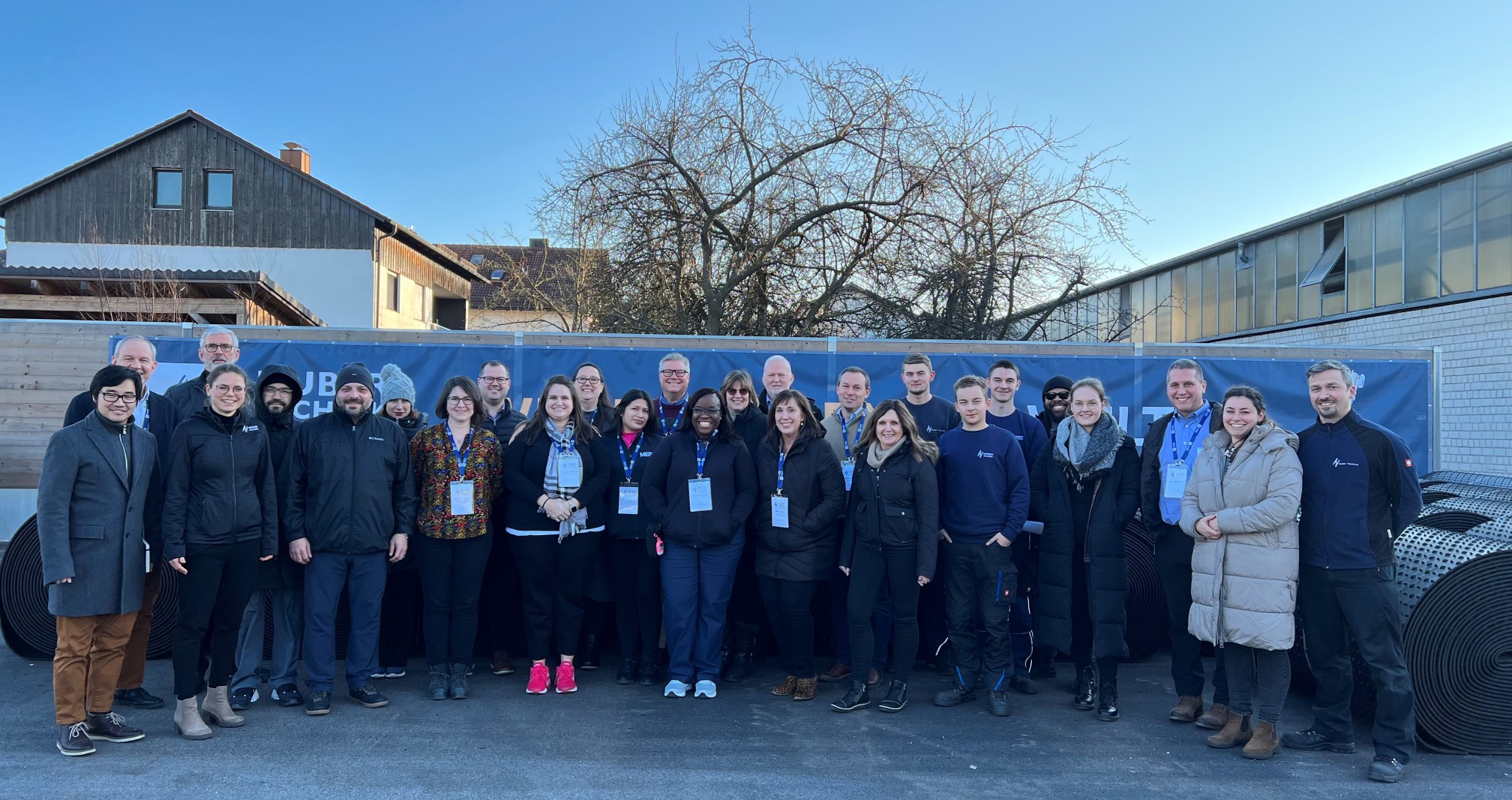
From February 5 to February 10, 2023, a 17-person delegation of Americans visited Munich and Augsburg as part of the America Works series of three Stronger Together Manufacturing Workforce Missions to learn about Germany’s apprenticeship and workforce development system. The participants were from 12 states and represented 14 different Manufacturing Extension Partnership (MEP) centers from around the country; they also represented the federal government and academics focused on manufacturing workforce development.
Beginning in Munich, the delegation met with the Chamber of Industry and Commerce for Munich and Upper Bavaria for an overview of the German dual system of apprenticeship training with approximately 325 standardized training occupations. The chambers of industry and commerce around the country play a monitoring role in Germany’s VET system, helping provide training but also certifying companies and trainers and implementing the examinations, and awarding certificates to those students who successfully complete their apprenticeship programs. The group then visited a Siemens Training Center and had the opportunity to engage with trainers and apprentices in technical fields to learn about their motivations and experiences undertaking vocational education. The Munich office of the Federal Employment Agency shared information on the services they provide to assist young people with vocational education and career guidance, which begins in secondary school and continues well into individuals’ professional life. In 8th and 9th grade, for example, most German students travel with their school classes to the employment agencies to visit their Job Information Center, where they can research and learn about the 300+ apprenticeship programs.
 A visit to the Berufsschule für Fertigungstechnik (BSFT) / Vocational School for Production Technology, which has been providing technical education for over 100 years, gave the delegation an opportunity to understand the role vocational schools play in providing continued compulsory secondary education while also providing students with theoretical training that supplements the practical work students complete in companies during their apprenticeship programs. At Huber Technik, a fourth-generation family-owned Mittelstand company located in Erding outside of Munich, the group met with the management team, the lead trainer, and apprentices gaining an appreciation for the value and commitment small manufacturers give to apprenticeship programs as part of their company culture. Large manufacturers also invest significantly in the programs, as was demonstrated by the delegation’s visit to BMW, where they toured the factory and met with apprentices at BMW’s Training Center in Munich to discuss their education and career interests following the completion of their training.
A visit to the Berufsschule für Fertigungstechnik (BSFT) / Vocational School for Production Technology, which has been providing technical education for over 100 years, gave the delegation an opportunity to understand the role vocational schools play in providing continued compulsory secondary education while also providing students with theoretical training that supplements the practical work students complete in companies during their apprenticeship programs. At Huber Technik, a fourth-generation family-owned Mittelstand company located in Erding outside of Munich, the group met with the management team, the lead trainer, and apprentices gaining an appreciation for the value and commitment small manufacturers give to apprenticeship programs as part of their company culture. Large manufacturers also invest significantly in the programs, as was demonstrated by the delegation’s visit to BMW, where they toured the factory and met with apprentices at BMW’s Training Center in Munich to discuss their education and career interests following the completion of their training.
 In Augsburg, the delegation visited the KJF Vocational Training and Youth Assistance Center (KJF BBJZ) Sankt Elisabeth where young people with special needs in the areas of learning and emotional-social development who do not have the same chances in the existing regular system, learn, live, and work. With the help of individualized support, adolescents and young adults can be prepared for their vocational training in 20 occupations, acquire their vocational qualifications, and thus find their place in work and society. They also had the opportunity to visit the Fraunhofer Institute for Casting, Composite, and Process Technology, one of 76 institutes throughout Germany that connects science and industry by providing applied research services. In addition to research and technology support, the Fraunhofer Institute has assisted German firms adapt the dual system of apprenticeship training for use at subsidiaries overseas in South Korea. Rounding out the week, the delegation visited BSH Home Appliances in Dillingen, a leading producer of dishwashers, and SGL Carbon in Meitingen, a technology-based company producing high-quality products made from specialty graphite and composites, which have each maintained apprenticeship programs for 60 and 75 years respectively. The leaders at both companies captured key benefits of the education system, explaining that “the apprenticeship system is not a process, but rather a culture that’s critical to companies’ success,” also noting that the program allows them to “introduce young people to their company culture so that they become part of the family.”
In Augsburg, the delegation visited the KJF Vocational Training and Youth Assistance Center (KJF BBJZ) Sankt Elisabeth where young people with special needs in the areas of learning and emotional-social development who do not have the same chances in the existing regular system, learn, live, and work. With the help of individualized support, adolescents and young adults can be prepared for their vocational training in 20 occupations, acquire their vocational qualifications, and thus find their place in work and society. They also had the opportunity to visit the Fraunhofer Institute for Casting, Composite, and Process Technology, one of 76 institutes throughout Germany that connects science and industry by providing applied research services. In addition to research and technology support, the Fraunhofer Institute has assisted German firms adapt the dual system of apprenticeship training for use at subsidiaries overseas in South Korea. Rounding out the week, the delegation visited BSH Home Appliances in Dillingen, a leading producer of dishwashers, and SGL Carbon in Meitingen, a technology-based company producing high-quality products made from specialty graphite and composites, which have each maintained apprenticeship programs for 60 and 75 years respectively. The leaders at both companies captured key benefits of the education system, explaining that “the apprenticeship system is not a process, but rather a culture that’s critical to companies’ success,” also noting that the program allows them to “introduce young people to their company culture so that they become part of the family.”
 During the group’s final working session at the Riegele Brewery in Augsburg, the group worked to develop content for their March 2nd webinar, “What We’re Taking Back from Germany,” which will include representatives from MEPs around the United States. Rather than simply re-state facts about the VET system, the participants wanted to share their lessons and tangible recommendations for American organizations. The group broke up into teams to create recommendations for:
During the group’s final working session at the Riegele Brewery in Augsburg, the group worked to develop content for their March 2nd webinar, “What We’re Taking Back from Germany,” which will include representatives from MEPs around the United States. Rather than simply re-state facts about the VET system, the participants wanted to share their lessons and tangible recommendations for American organizations. The group broke up into teams to create recommendations for:
- Education and Youth Programs
- National Policy
- MEP Centers nationally
- Small- and medium-sized manufacturing companies
In short, the Stronger Together participants left Germany inspired to make changes in their local communities, excited to engage the local and national stakeholders, and ready to share their new knowledge of the German VET system to improve the American manufacturing workforce.

 The Stronger Together Manufacturing Workforce Missions are organized and administered by America Works, a program of MAGNET: The Manufacturing Advocacy and Growth Network, and the American Council on Germany with generous support from the Transatlantic Program of the Government of the Federal Republic of Germany through funds of the European Recovery Program (ERP) of the Federal Ministry of Economic Affairs and Climate Action (BMWK).
The Stronger Together Manufacturing Workforce Missions are organized and administered by America Works, a program of MAGNET: The Manufacturing Advocacy and Growth Network, and the American Council on Germany with generous support from the Transatlantic Program of the Government of the Federal Republic of Germany through funds of the European Recovery Program (ERP) of the Federal Ministry of Economic Affairs and Climate Action (BMWK).


